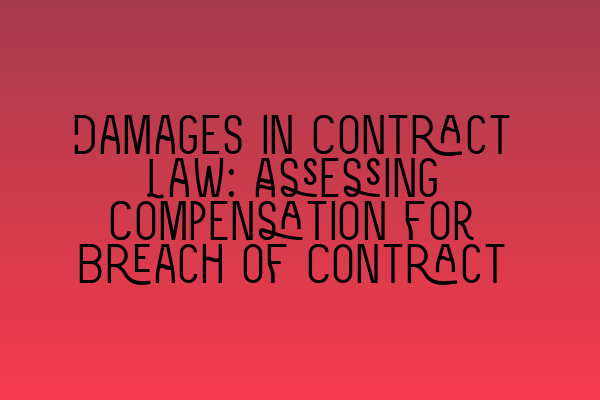Damages in Contract Law: Assessing Compensation for Breach of Contract
In contract law, damages are a common remedy sought by parties who have suffered a breach of contract. When one party fails to fulfill the obligations set out in a contract, the non-breaching party may be entitled to compensation for any losses they have suffered as a result.
Assessing the appropriate amount of damages can be a complex process, requiring careful consideration of various factors. In this article, we will explore the basics of damages in contract law and discuss how compensation is calculated.
Types of Damages
There are several types of damages that may be awarded in contract law. The most common types are:
- Compensatory Damages: These are damages awarded to compensate the non-breaching party for any losses they have suffered as a direct result of the breach of contract. The aim is to put the injured party in the position they would have been in if the contract had been performed as agreed.
- Consequential Damages: These are damages that are awarded for losses that are not directly caused by the breach of contract but are a foreseeable consequence of it. For example, if a supplier fails to deliver goods on time and, as a result, the buyer loses business with their own customer, the buyer may be entitled to consequential damages.
- Liquidated Damages: Liquidated damages are damages that are agreed upon by the parties prior to entering into the contract. These damages are typically specified in a liquidated damages clause and are often awarded when it would be difficult to calculate the actual damages suffered.
- Punitive Damages: Punitive damages are not commonly awarded in contract law, as the aim is usually to compensate rather than punish. However, in certain cases of serious misconduct or fraud, punitive damages may be awarded to deter future similar behavior.
Calculating Damages
When calculating damages in contract law, the goal is to ensure that the injured party is placed in the position they would have been in had the contract been performed. This involves looking at the actual losses suffered as a result of the breach and determining a fair and reasonable amount of compensation.
Factors that may be taken into account when calculating damages include:
- The nature of the breach
- The type of contract
- The cost of rectifying the breach
- Lost profits or earnings
- Out-of-pocket expenses
- Any other losses directly caused by the breach
It is important to note that the injured party has a duty to mitigate their losses. This means taking reasonable steps to minimize the impact of the breach and to mitigate any potential losses. Failure to do so may affect the amount of damages awarded.
Conclusion
Damages are a fundamental aspect of contract law, providing a means of compensation for parties who have suffered as a result of a breach of contract. Calculating damages requires a careful consideration of various factors and a fair assessment of the losses suffered.
At SQE Contract Law, we understand the complexities involved in assessing damages in contract law. Our team of expert solicitors is well-versed in contract law and can provide expert advice and representation in a wide range of contract disputes.
If you would like to learn more about our services or have any specific questions about damages in contract law, please contact us. We also offer SQE 1 preparation courses and SQE 2 preparation courses to help you excel in your legal career.
Stay updated with the latest SRA SQE exam dates by visiting our website: SRA SQE Exam Dates.
